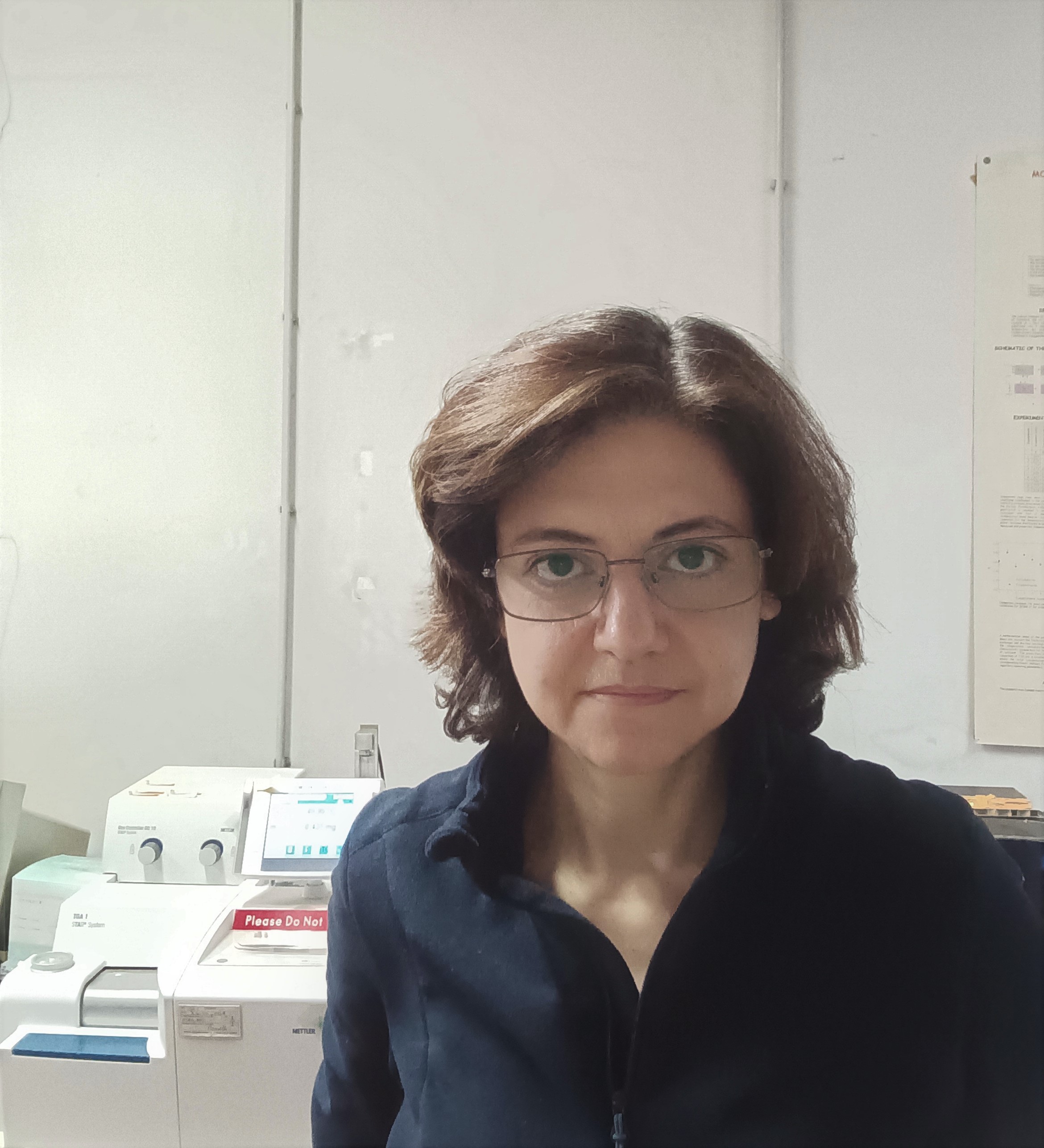Carmen Branca
Researcher
![]() carmen.branca(at)stems.cnr.it
carmen.branca(at)stems.cnr.it
![]() +39 0817682226 / 0817682232
+39 0817682226 / 0817682232
![]() P.le Tecchio 80 - 80125 - Naples - (NA)
P.le Tecchio 80 - 80125 - Naples - (NA)
- Research Activities
- Biographical Notes
- Laboratories/Service
Research activities cover the following two lines:
Pyrolysis, gasification, and combustion of biomass.
Fire response of polymeric and composite materials.
Investigation of thermochemical conversion processes of biomasses includes:
Formulation of reaction mechanisms and development of kinetic models(also estimation of kinetic parameters and reaction heats) for biomass thermos-chemical conversion.
Characterization of biomass pyrolysisin relation to conversion dynamics (thermal field and volatiles release rates), yields and composition/properties of the lumpedproduct classes (bio-oil, gas, biochar) on a laboratory scale, for conditions reproducing those typical of fixed-bed and fluidised-bed reactors, and for the 'single particle' system.
Experimental and kinetic assessment of the reactivity and the combustion dynamics of biochar and bio-oil.
Investigation of the influences of sample properties, pre-treatments, operating conditions, and presence of alkaline and acid catalysts on the thermicity of the biomass pyrolysis process, the distribution of the product classes, the composition of bio-oil and the bio-char properties.
Development of predictive comprehensive mathematical models (description of transport phenomena and chemical reactions) for pyrolysis, gasification and combustion of biomass particles and reactors.
The analysis of the fire response of polymer composite materials includes:
Experimental analysis of reaction mechanisms and flammability properties.
Kinetic modelling of the pyrolytic and oxidative decomposition.
Development of transport model and numerical simulation of lab-scale instruments (e.g.. cone calorimeter) for fire performance evaluations.
Carmen Branca is a researcher of the National Research Council (CNR) since January 2008, first at the Combustion Research Institute (IRC) (up to the year 2020) and currently at the Institute of Sciences and Technologies for Sustainable Energy and Mobility (STEMS).
Shegraduated in Chemical Engineering (July 1997) at the University of Naples "Federico II" with a thesis on the influence of the mineral matter on the pyrolysis kinetics of straw.In March 2003 she received the title of Doctor of Philosophy in Chemical Engineering from the University of Naples "Federico II", with a thesis on the reaction kinetics and products of wood pyrolysis. During her PhD study, she produced publications, which are still among the most widely cited in the literature, regarding kinetic modelling of wood and biomass pyrolysis and the development of a new method for bio-oil characterisation, which has become, together with the results of the characterisation, a reference for numerous international laboratories.
From 1997 to 2007, she has been a scientific collaborator (pre- and post-doc research grant holder) at the Department of Chemical Engineering of the 'University of Naples "Federico II", on topicsconcerning biomass and solid fuel thermochemical conversion, more specifically the development of innovative experimental systems at both the micro and the macro scale, the thermo-gravimetric and GC/MS analysis, the software development for kinetic parameter estimation and simulation of transport phenomena. The effects of flame-retardant treatments on wood combustion were also deeply investigated.
Most of the research activities of Carmen Branca have been conducted within the framework of European and national research projects, concerning the thermochemical conversion of agricultural wastes and the fire response of composite polymeric materials. She has also been involved in prominent European networks for the study of pyrolysis and gasification of lignocellulosic biomass.
Since 2006 she has been a Teaching Assistant for the courses of "Dynamics and Control of Chemical Processes", "Thermochemical Conversion of Solid Fuels" and "Thermal Processes for Energy Conversion from Biomass and Waste" (Masterdegree courses in Chemical Engineering of the 'University of Naples "Federico II"), and she has been co-supervisor of about 60 theses for the Master degree in Chemical Engineering.From 2019 to 2022, she held a teaching position for the international course “Biomass Thermal Conversion Processes” within theMaster degree programme in “Precision Livestock Farming” of the Department of Veterinary Medicine and Animal Production of the 'University of Naples "Federico II".
Since 2013, Carmen Branca has held the national scientific qualification of the MIUR as full professor for the disciplinary scientific sector 09/D2 - Systems, methods, and technologies of chemical and process engineering.
She is Reviewer for several international journals, such as Industrial & Engineering Chemistry Research, Journal of Analytical and Applied Pyrolysis, Energy & Fuels, Thermochimica Acta, Fuel, Fire Safety Journal, Combustion and Flame, Applied Biochemistry and Biotechnology. She is also member of the Editorial Board, also acting as guest editor of special issues, of the MDPI journals Processes and Reactions.
The research activity carried out by Carmen Branca is testified by 80 publications in international journals with peer- review, all providing valuable and useful insights for future research activitiesas evidenced by the approximately 3750 citations with an h-index = 37 by November 2022 (SCOPUS). The noteworthy research activity has resulted in she being ranked, since 2019, among the World’s Top 2% Scientists according to the Stanford University database.
Currently, the research activity of Carmen Branca is focused oninvestigating the effects of acid and alkaline catalysts on the pyrolysis of lignocellulosic materials. A recent highly innovative result concerns the identification of a new conversion regime, named pyrolytic runaway, characterised by an extremely rapid self-heating of biomass-packed beds, triggered by the onset of exothermic reactions, which ultimately results in a surprisingly fast conversion despite mild external heating conditions. These results could decisively boost the development and optimisation of sustainable technologies, by providing a viable route to significantly reduce the external energy requirements of plants to produce biofuels and valuable chemical species for applications in the green chemistry industry.
- Active Projects
- Closed Projects



